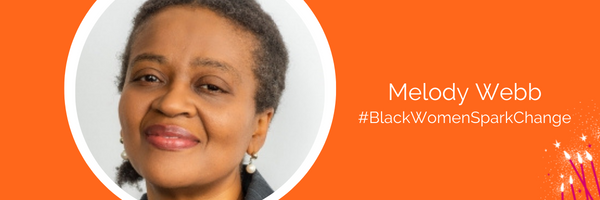
Melody Webb is the Chief Executive Officer and Executive Director of Mother’s Outreach Network, a non-profit that supports the economic empowerment of disadvantaged Black mothers in the DC area. The organization uses legal programming, policy and advocacy and community outreach to help these women.
From an early age, Melody knew she was drawn to community mobilization work.
“I grew up raised by parents who actually married a few months out of their teens years and who were giving to their own communities. And so I was just kind of raised with this belief that you have something, you share and you give back. And so it’s kind of the way that I am wired,” Melody says.
For her thesis project at Harvard Law School, Melody conducted a field study on young men allegedly engaged in selling illegal substances. She spent time on the ground, looking beyond the surface level to understand how the men are viewed by their own communities. This experience continues to inform her work today.
“I bring to all of the work that I do a multidisciplinary approach that is driven by and informed by what I believe is the perspective of impacted people,” she explains.
After graduating, Melody embarked on a career that has consisted entirely of working as a public interest lawyer.
“I am an adherent to what is considered to be ‘movement lawyering’ or ‘community lawyering.’ And that is lawyering that is directed by people who are impacted by the issues you work on, lawyering that is done ideally in conjunction with people whose issues you’re working on, and in doing so empowering the community to change systems long after the lawyers are gone, “ Melody adds.
Specifically, Melody represented parents whose children were involuntarily removed from their care and placed in the foster care system.
“Poverty was a driver,” she says. “Potentially an intervention of addressing the lack of cash resources, a lack of housing early on, could prevent many of the families from being in the system.”
Representing families in a system rigged against them often made Melody feel powerless. Instead of allowing herself to become desensitized to the problem, she decided to shift her focus to the root of these issues through Mother’s Outreach Network.
“Children being removed from their parents is the worst manifestation of poverty that there can be. And so our work is meant to really transform this system in conjunction with the families we work with and in conjunction with allies across the country who are doing similar kinds of work,” she explains.
Working to Destigmatize Guaranteed Income in DC
One of the ways Melody supports the women she works with is by advocating for Guaranteed Income.
“Guaranteed income, we believe, is the path to assuring that people receive the cash assistance and supports they need to live with dignity and to make the choices that they find appropriate for their own families,” she explains.
DC is one of the many areas in the country that considers poverty a factor in removing children from their homes. Melody believes that by providing parents with the basic resources they need, more families can stay together.
“It’s too easy for people to blame them for their economic circumstances. And so we’re working hard to change this very negative narrative, particularly around Black mothers who are lower and no income, to show that it really is that parents are working hard and it’s more a system that sets people up to fail and surveil them rather than supports them,”
Focus on What Drives You
Melody encourages future change makers to focus on the causes they are passionate about – even if it takes years for others to notice.
“It’s possible to awaken people to the issues,” she says.
Inspired by her parents’ example and her professional experiences, Melody continues to stay focused on transforming the current system that weaponizes the child welfare scheme and punishes parents.
“There’s a deep need for addressing these issues for families, individually and also systemically,” she says, adding that, “people tend to move and change and think a little bit deeply when they understand that those incidents of abuse that you hear about are absolutely terrible, but they’re a fraction of the families who end up in the system.”
